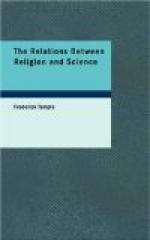If a miracle were worked science could not prove that it was a miracle, nor of course prove that it was not a miracle. To prove it to be a miracle would require not a vast range of knowledge, but absolutely universal knowledge, which it is entirely beyond our faculties to attain. To say that any event was a miracle would be to say that we knew that there was no higher law that could explain it, and this we could not say unless we knew all laws: to say that it was not a miracle would be ex hypothesi to assert what was false. In fact, to assert the occurrence of a miracle is simply to go back to the beginning of science, and to say: Here is an event which we cannot assign to that derivative action to which we have been led to assign the great body of events; we cannot explain it except by referring it to direct and spontaneous action, to a will like our own will. Science has shown that the vast majority of events are due to derivative action regulated by laws. Here is an event which cannot be so explained, any more than the action of our own free will can be so explained. Science may fairly claim to have shown that miracles, if they happen at all, are exceedingly rare. To demonstrate that they never happen at all is impossible, from the very nature of the evidence on which Science rests. But for the same reason Science can never in its character of Science admit that a miracle has happened. Science can only admit that, so far as the evidence goes, an event has happened which lies outside its province.
To believers the progress of Science is a perpetual instruction in the character which God has impressed on His works. That He has put Order in the very first place may be a surprise to us; but it can only be a surprise. In the great machinery of the Universe it constantly happens to us to find that that which is made indispensable, is nevertheless not the highest. The chosen people were not the highest in all moral or even in all spiritual characteristics; if we refuse the explanation given by Goethe that they were chosen for their toughness, yet we have no better to give. The eternal moral law is of all we know the highest and holiest. Yet the religious instinct seems to have been more indispensable for the development of humanity according to the Divine purpose than the observance of that moral law in all its fulness. It would never have occurred to us beforehand to permit in Divine legislation any concession to the hardness of men’s hearts; yet we know that it was done. Science now tells us that Order takes a rank in God’s work far above where we should have placed it. It is not the highest; it is far from the highest: but it appears to be in some strange way the most indispensable. God is teaching us that Order is far more universal, far more penetrating than we should have supposed. But, nevertheless, it is not itself God; nor the highest revelation of God. It is the stamp which, for reasons higher than itself, He appears to have put




